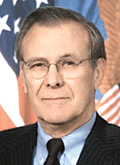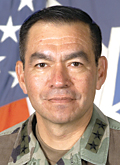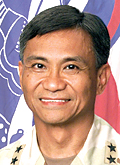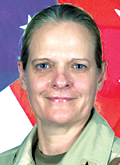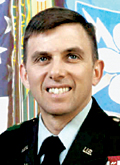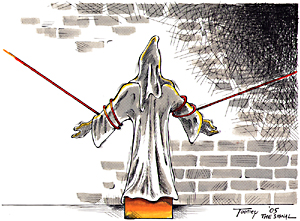 Marshall Toomey/For The Signal (click image to enlarge) |
From Santa Clarita to Abu Ghraib, One Year Later
By Leon Worden Sunday, April 24, 2005
|
*MEDIA—MANDATORY CREDIT: The Signal newspaper of Santa Clarita, Calif.
|
| W |
Why?
No, not the Big Why. Not, "Why did we allow this to happen?" That's too broad, and perhaps too subjective.
Here at The Signal, our "why?" was much narrower than that. And much closer to home. And, one would have thought, much easier to answer.
Our "why?" was simply this:
Why did an Army general identify a copier and printer technician from Canyon County as one of only four people who were "either directly or indirectly responsible for the abuses" at Abu Ghraib prison?
How could that possibly be?
We searched for the answer. Days turned into weeks. Weeks turned into months. Over the course of the next year, we would write dozens of stories and conduct hundreds of phone interviews with officials in Washington and Baghdad and innumerable points between — all geared toward finding out why.
The trail took us to an examination of Army regulations and Senate testimony. We explored the role of private military firms, like the one our local man worked for. We followed leads to congressional policymakers and, when our man's nationality was questioned, to foreign heads of state.
A year went by and we were no closer to knowing why.
Until Wednesday.
On Wednesday, Maj. Gen. Antonio Taguba, the Army general who implicated our Santa Clarita man 13 months earlier, flew out from Washington to lecture to an Asian and Latino studies class at California State University, Long Beach.
The second-highest ranking Filipino-American in the military and, with three master's degrees, one of the most highly educated, Taguba was to give a talk on the role of education in his career.
Now the deputy assistant secretary of defense for readiness, training and mobilization — his Kuwait tour and Abu Ghraib investigation well behind him — Taguba spent a bit more time telling the students about the new combat uniforms, which fall under his purview, than about education.
No matter.
The opportunity presented itself after the lecture.
ANSWERS
Of course, we expected nothing more than "no comment." But finally, a year later, with no secretaries, no voice mail, no official Army spokeswomen between us and our Santa Clarita man's accuser, we'd be able to present the nagging question:
Why?
Without hesitation, the general explained:
"Only because of his association with Stefanowicz. Both of those two worked together."
On Friday we ran the headline, "Guilt by Association?"
Stefanowicz, Steven A., was a civilian contract interrogator Taguba suspected of harsh tactics, such as ordering military dogs to bark at prisoners to invoke fear. The prisoners would be more likely to open up and give answers that way. But the tactic happens to violate two of the four Geneva Conventions. One safeguards Iraqi prisoners of war from intimidation; another covers Iraqi civilian detainees.
John B. Israel, our man from Santa Clarita, was Stefanowicz' interpreter. Born in Baghdad in 1955, his job was to translate Stefanowicz' questions from English into his native tongue, and the prisoners' answers from Arabic into English. As he testified to Taguba, "no more, no less."
The pair arrived at Abu Ghraib prison, 20 miles west of Baghdad, in early and mid-October 2003.
They were at the prison on the night of craziness. They were at the prison the night the guards from the 800th Military Police Brigade went berserk. They were at the prison the night Iraqi prisoners were stripped and hooded and piled into freakish pyramids and threatened with dogs and forced to masturbate and attached to electrodes and bound and gagged and bent and broken — and murdered.
They were at the prison the night America was put to shame.
Four months later, as Taguba was compiling his report, Israel told him he saw nothing.
Didn't even hear rumors.
Long hours of arduous work at the sorely understaffed prison left him weary, he said. He didn't want to interfere when the interrogators or guards talked among themselves, he said. He was happy just to go to his room and be left alone at the end of his 12- to 30-hour shift, he said.
Taguba didn't believe him.
Again. Why?
"Because of the statements that he made. Witness statements. It was conflicting."
Simple. Direct. But, correct?
Gen. Taguba, sir, do you believe John Israel witnessed things he should have reported?
"I think so."
"Probably his only failing," Taguba confided, "was that he was not trained properly, and obviously he was influenced."
And just whose fault was that?
BAD APPLES
On May 24, 2004, President Bush decried Abu Ghraib prison as "a symbol of disgraceful conduct by a few American troops who dishonored our country and disregarded our values."
From that remark, Pentagon officials began to describe the acts depicted in the photographs that had made their way first to Seymour Hersh at The New Yorker and then to "60 Minutes II" as the work of "a few bad apples."
They may have been right, as far as the photographs were concerned. The pictures may have been taken in a single evening.
Evidently there's video, too.
But Taguba concluded that the real problem ran deeper.
As his investigation of the MP guards' activities on the night in question began to take shape, he collected testimony indicating that wrongful acts were being committed routinely on the other side of the fence — the military intelligence (MI) side.
At Abu Ghraib, as in other U.S. military prison compounds, there is a division of labor between the MPs and MI. The MPs are responsible for guarding detainees and protecting them from harm; the job of MI personnel is to glean intelligence information from the prisoners.
The two goals would seem to conflict, and indeed, military doctrine forbids any crossover between the two functions. Never the twain shall meet.
Some of the testimony in the Taguba Report indicates a blurring of the lines.
SCOPE OF INQUIRY
It must be understood that Taguba's investigation — ordered by the three-star commander of U.S. and coalition ground forces in Iraq, Lt. Gen. Ricardo S. Sanchez, days after the shocking photographs were brought to Sanchez's attention by MP Spc. Joseph Darby — was limited to the MP side of things.
On Jan. 19, 2004, when Sanchez asked U.S. Central Command to appoint an investigator, he wrote: "Recent reports of detainee abuse, escapes and accountability lapses indicate systemic problems within the (800th MP) brigade and suggest a lack of clear standards, proficiency, and leadership."
Acknowledging that a separate military criminal investigation was already being conducted into specific shootings and escapes, Sanchez wrote, "The purpose of this request is to gain a more comprehensive and all-encompassing inquiry, conducted by a senior leader from outside of CJTF-7 (Sanchez's command), to make findings and recommendations concerning the fitness and performance of the 800th MP Brigade" from Nov. 1 to date.
Sanchez's request was forwarded to Lt. Gen. David D. McKiernan, commander of the U.S. Third Army (or Coalition Forces Land Component Command, as it was designated in Iraq).
The 800th MP Brigade was technically a component of CFLCC, but its tactical operational control had been transferred to CJTF-7.
On Jan. 31, McKiernan appointed his two-star deputy commander, Taguba, to conduct the investigation. McKiernan broadened the scope of work ever so slightly.
"You should also investigate the training, standards, employment, command policies, internal procedures, and command climate in the 800th MP Brigade as appropriate," he wrote.
|
|
COMMAND CONFUSION
Sanchez's decision to place the MI officers in charge of Abu Ghraib prison on Nov. 19 was extraordinary. Normally, the MPs run the prisons.
Now, just as the 800th was technically part of CFLCC but not tactically, so were the MP guards technically — but no longer tactically — under the command of Brig. Gen. Janis L. Karpinski of the U.S. Army Reserve.
After Nov. 19, the entire prison, MPs and MIs alike, were under the control of the MI commander, Col. Thomas M. Pappas.
Karpinski remained in command of Iraq's other U.S.-run prisons.
Confusion and turmoil abounded.
"I find that there was clear friction and lack of effective communication between (Pappas), who controlled (Abu Ghraib) after (Nov. 19), 2003, and (Karpinski), who controlled detainee operations," Taguba wrote in his final report. "There was no clear delineation of responsibility between commands, little coordination at the command level, and no integration of the two functions."
"(Brig. Gen.) Karpinski was extremely emotional" during much of her four-hour testimony, Taguba wrote. "What I found particularly disturbing ... was her complete unwillingness to either understand or accept that many of the problems inherent in the 800th MP Brigade were caused or exacerbated by poor leadership and the refusal of her command to both establish and enforce basic standards and principles among its soldiers."
Karpinski took exception to the characterization.
"(Taguba) made it sound like I was blubbering and crying the whole time I was being interviewed, like I was an out-of-control, emotionally distraught woman," Karpinski later told The Signal. "The only time there were tears in my eyes, and I did get emotional, was when I was defending my soldiers. ... I felt like all of their accomplishments were being pulled away from them, by design, for something that they didn't do or have any participation in, with the exception of the six or seven who were so vividly photographed."
"But it wasn't me who was overwhelmed," Karpinski said. "Every man in that room — and there were six of them — was in tears when my statement was finished. Every one of them. Including Taguba. And I think that they were embarrassed by that."
Karpinski blames herself for not questioning orders.
"Hold me responsible for what I can be responsible for," she told The Signal. "When they did that (order) transferring responsibility to the MI brigade (on Nov. 19, 2003), I should have demanded clarification on responsibilities and roles and the chain of command."
Taguba wrote that Karpinski "blames much of the abuse that occurred in Abu Ghraib on MI personnel and stated that MI personnel had given the MPs 'ideas' that led to detainee abuse. ... She argued that problems in Abu Ghraib were the fault of Col. Pappas and (Lt. Col. Steve) Jordan because Col. Pappas was in charge of Abu Ghraib."
"I think it important to point out," Taguba wrote, "that almost every witness testified that the serious criminal abuse of detainees at Abu Ghraib occurred in late October and early November 2003" — a time when Karpinski's authority over her MPs was undisputed. "The photographs and statements clearly support that the abuses occurred during this time period."
In his questioning of Israel and Stefanowicz, however, Taguba was particularly interested in an incident that reportedly occurred Nov. 24, 2003, on Pappas' watch.
There had been a shooting. The shooter was believed to be a detainee who was scheduled to be interviewed by Stefanowicz and Israel the same evening.
From his questioning of Stefanowicz, Israel and others, it is evident that Taguba believed Stefanowicz used military dogs to scare the detainee into giving up information.
Stefanowicz and Israel — at all times subordinate by contract to Pappas and Jordan, never to Karpinski — denied it. They also told Taguba that they'd received little or no training in the Geneva Conventions or Army regulations that would have forbidden them from using dogs or other intimidating tactics when questioning prisoners.
Taguba asked Pappas: "Do you know if (Stefanowicz and Israel) were given any instructions on the Geneva Convention ... and on their understanding ... that they could be charged as a war criminal if they violate that?"
"Sir," Pappas replied, "I did not have the program to do that."
Some of the testimony Taguba collected from MI personnel tends to support both Karpinski's and individual MPs' assertions that the MIs wanted the MPs to "soften up" detainees for questioning — contrary to military prohibitions on MP involvement in interrogations.
"There was not an established procedure as to how detention operations conducted by the MPs and interrogation operations being conducted by the MI units should interact," Pappas told Taguba. "In practice, the interrogation team ... gives the interrogation plan directly to the MP guard that is going to work with MI when direct coordination is authorized."
"To my knowledge," Pappas testified, "instructions given to the MPs ... such as shackling, making detainees strip down or other measures to use on detainees before interrogations are not typically made unless there is some good reason."
NEW ROLES
The decisions that led to the maltreatment of prisoners cannot be viewed in isolation from the context in which they were made.
Before the outbreak of the war, military planners estimated that 30,000 to 100,000 enemy prisoners of war would have to be housed and interrogated. They prepared to establish 12 prisons to be run by several Army Reserve battalions.
When President Bush declared the end of major hostilities on May 1, 2003, approximately 8,000 prisoners were being held at the coalition's only prisoner-of-war facility, Camp Bucca. Repatriation efforts were immediately initiated, cutting the prisoner population to less than 800. About 600 Iraqi criminals were being housed at other locations.
As the numbers fell, several reserve units that had been waiting in the wings were now awaiting demobilization and redeployment.
Operational changes were taking place, as well, as the command shifted from wartime mode to what was intended to be a stabilizing operation to help the Coalition Provisional Authority establish basic services to the Iraqi people.
Sanchez was promoted from two stars to three in mid-June and given command of the Army's V Corps, which shifted 495 troops — of an approved 1,400 — from Germany to Iraq as CJTF-7.
Karpinski was frocked as a general in late June and given command of the 800th.
Then came the Iraqi insurgency.
Sanchez designated Abu Ghraib, which had been set to be closed, as the central detention facility to house the detainees whose numbers were growing exponentially.
Understaffed as it was in MP guards and MI operatives, it was hurting for people who spoke enough Arabic to tell them what the prisoners knew about the next insurgent attack. The Army turned to the private sector for help, requisitioning thousands of interpreters from its leading provider of civilian linguists, San Diego-based Titan Corp. — people like John Israel.
"Pressure increased to obtain operational intelligence on the enemy's identity, support systems, locations, leadership, intelligence sources, weapons and ammunition caches, and centers of gravity," according to an Army report.
Plus, Saddam Hussein was still on the loose, and by autumn it was getting more than a little irksome.
The Army wanted answers on his whereabouts — and it wanted them from his suspected associates, who would be hauled in for questioning at Abu Ghraib.
On Aug. 31, Maj. Gen. Geoffrey D. Miller, commander of the U.S. detention center at Guantanamo Bay, Cuba, aka "Gitmo," led a team to Iraq to assess the effectiveness of the intelligence gathering effort.
THE MILLER VISIT
Exactly what transpired among Miller, Sanchez and Pappas has been a matter of conjecture. Many considered it an effort by Miller to "Gitmo-ize" Abu Ghraib by spreading the interrogation tactics Miller developed for Guantanamo Bay — where the Geneva Conventions didn't apply to al-Qaida terrorists — to the Iraqi theater, where the conventions applied.
Miller would later tell the Senate Armed Services Committee that he made recommendations for "intelligence fusion, interrogation and humane detention" and "laid the basis that they must be in concert with the Geneva Convention, and gave recommendations from our experience about how those three functions could be done successfully."
Among his recommendations was that MPs "be actively engaged in setting the conditions for successful exploitation of the internees."
Military doctrine generally forbids MPs from "setting the conditions" for interrogations, aka "softening up" detainees.
"The recommendations of (Maj. Gen.) Miller's team that the 'guard force' be actively engaged in setting the conditions for successful exploitation of the internees would appear to be in conflict with ... Army Regulation 190-8 that military police 'do not participate in military intelligence supervised interrogation sessions,'" Taguba wrote.
Pappas told Taguba the policies and procedures that were developed for Iraq "were enacted as a specific result of a visit" by Miller, and that interrogation teams from Guantanamo Bay were active at Abu Ghraib in October.
Pappas said Miller's advice led him to believe it was acceptable to use military dogs to persuade prisoners to talk, as long as the dogs were muzzled.
"(Miller) said that they used military working dogs, and that they were effective in setting the atmosphere for which you could get information," Pappas testified. "Certainly using the dogs, OK, in the booth with or without a muzzle, they would have been leashed, and it would never be my intent that the dog be allowed to bite or in any way touch a detainee or anybody else."
"In the execution of interrogations and the interrogation business in general," Pappas leveled with Taguba, "we are trying to get information from people. We have to create an environment not to permanently damage them or psychologically abuse them, but we have to assert control and get detainees into a position where they're willing to talk to us."
Army officials told The Signal that Miller never told Pappas he could use military dogs in interrogations.
AUTHORIZATION NEEDED
In September and October 2003, Sanchez drafted interrogation policies that stated they were "modeled on the one implemented for interrogations conducted at Guantanamo Bay, but modified for applicability to a theater of war in which the Geneva Conventions apply."
|
|
The second memo, dated Oct. 12, dealt with civilian detainees and didn't include the harsher methods.
Pappas told Taguba he requested and received Sanchez's approval to use dogs.
Sanchez told The Signal earlier this month that he never saw or approved any requests to use harsh interrogation tactics.
Karpinski said she saw Sanchez's approval on "at least two" such requests.
"(Pappas) once told me he had never been assigned anywhere near a military interrogation unit and he was learning on the fly," Karpinski told The Signal last week.
"Pappas was intimidated and he was under tremendous pressure to find Saddam, no matter the cost," she said. "He put everything in a memo, not really out of fear or in an attempt to later have record of his numerous attempts to get guidance on techniques, but more likely because he simply did not know how far he could go and he wanted Sanchez to know how hard he was trying to give him what he wanted."
Karpinski continued: "There are some eyewitness statements saying Sanchez put his thumb into Pappas' chest and emphatically told him with repeated thumps to his chest to get Saddam and get the intelligence leading to Saddam, then asked him if he understood.
"Pappas was probably trembling in his boots," she said. "He was intimidated by (Maj. Gen. Barbara) Fast (Sanchez's intelligence chief), (Maj. Gen. Walter) Wodjakowski (Sanchez's top deputy) and Sanchez, and you better believe he was scared to death of Miller and his long reach.
"Pappas sent daily reports to Miller just to make sure Miller knew he was doing everything Miller suggested during his visit. Pappas wanted to please these (general officers) and get them out of his face. He would have stood on his head in the middle of downtown Baghdad if Sanchez told him to do so."
A GOOD FRIEND
Taguba wrote in his final investigation report, "I totally concur with (Lt. Gen.) Sanchez's opinion regarding the performance of (Brig. Gen.) Karpinski and the 800th MP Brigade."
He was referring to Sanchez's opinion "that the performance of the 800th MP Brigade had not met the standards set by the Army or by CJTF-7;" that "incidents in the preceding six months had occurred that reflected a lack of clear standards, proficiency and leadership within the brigade;" and that the "recent detainee abuse at Abu Ghraib (was) the most recent example of a poor leadership climate that 'permeates the Brigade.'"
We come to another, "why?"
If McKiernan instructed Taguba to investigate "the training, standards, employment, command policies, internal procedures, and command climate in the 800th MP Brigade as appropriate," why did Taguba look no higher than Karpinski?
If Pappas was in tactical control of the 800th MP Brigade during most of the period covered in Taguba's investigation — and if Pappas told Taguba he was acting on orders from Sanchez — why did Taguba stop at Karpinski?
Wednesday, Taguba told The Signal why.
He wouldn't have gone beyond Karpinski, he said, "unless I was given permission and authorization to do so. And I was not given that."
Granted, it would have been irregular for a two-star general to investigate a three-star general.
But there's another reason Taguba would have been the wrong person to investigate Sanchez.
"He's also a very good friend of mine, Ricardo Sanchez," Taguba said. "As much as he's a personal friend, he's a great human being. He's a great commander."
"When I see him," Taguba told the Asian and Latino studies students in Long Beach, "or I see my other Asian-American friends or my Hispanic friends and my African-American friends, we tend not to talk about what we do. We kind of gravitate towards, 'How's your kids?'"
Karpinski believes she's a scapegoat.
She believes Sanchez's purported approvals of Pappas' requests for permission to use harsh interrogation tactics warrant investigation.
And, she told The Signal, the buck shouldn't stop there.
She believed Defense Secretary Donald Rumsfeld must have consented to the use of the harsher interrogation methods.
After consulting with Rumsfeld, a Pentagon spokesman issued a denial.
"The secretary of defense was not involved in the process in Iraq or the Central Command theater," he told The Signal. "He wasn't asked to approve anything."
Taguba did believe, however, that the culpability of four people who were outside the scope of his MP inquiry — Pappas, Jordan, Stefanowicz and Israel — warranted further investigation.
He said Wednesday, "That's why I said they ought to have another 15-6 (inquiry), you know?"
UP THE LADDER
The tide turned for Sanchez after Taguba's report was leaked to Hersh at The New Yorker in May 2004 and the public began to comprehend that the maltreatment of prisoners went beyond what was depicted in the photographs.
While the House of Representatives remained mum — Howard "Buck" McKeon, R-Santa Clarita, a member of the House Armed Services Committee and John Israel's congressional representative, said through a spokesman that he wanted to let the Pentagon's "investigation follow its proper course to get to the bottom of it" — Senate Armed Services Committee Chairman John Warner, R-Va., pressed forward with hearing after hearing.
In late March, the Army had made good on Taguba's recommendation for an inquiry into the 205th MI Brigade. It announced the inquiry would be conducted by another two-star general, George R. Fay.
The selection of Fay, an Army reservist, quickly drew fire from critics who believed Fay lacked sufficient authority to investigate Sanchez. Not only did Sanchez outrank him; Sanchez himself had appointed him.
Responding to the outcry, the Pentagon quickly moved to replace Sanchez as the appointing officer so that a new investigator could be named, of equal or higher rank to Sanchez.
That same week, the Army announced that Sanchez would also be replaced as the U.S. commander in Iraq after the June 30 transfer of governmental power to Iraqi leaders.
It was a position Sanchez had wanted to keep.
But the Army was in full retreat from him.
And the word "scapegoat," previously reserved for Karpinski and her MPs, began to be heard in discussions of Sanchez, whose hopes for a fourth star were chilled.
On Aug. 25, the new investigator who'd been appointed to work with Fay, Lt. Gen. Anthony R. Jones, released his report.
Just as Sanchez had accused Karpinski of poor leadership, the Fay-Jones Report faulted Sanchez and his chief deputy, Wodjakowski, for "fail(ing) to ensure proper staff oversight of detention and interrogation operations."
While "the chain of command directly above the 205th MI Brigade was not directly involved in the abuses at Abu Ghraib," the Fay-Jones Report found, "policy memoranda promulgated by the CJTF-7 commander (Sanchez) led indirectly to some of the non-violent and non-sexual abuses."
Those policy memoranda — Sanchez's memos of September and October 2003, outlining his approved interrogation techniques — "left certain issues for interpretation: namely, the responsibility for clothing detainees, the use of dogs in interrogation, and applicability of techniques" to enemy prisoners of war, the report stated.
Fay and Jones investigated the actions of individual soldiers as well as civilian interrogators and translators and determined that some had broken the law. However, all names were omitted from the version of their report that was released to the public.
While Fay and Jones were investigating the 205th, then-Army Inspector General Paul T. Mikolashek was conducting a parallel investigation into the "root causes of the problems" in U.S.-run prisons in Iraq and Afghanistan.
Mikolashek identified 94 cases of prisoner abuse in the two countries since 2001 and ascribed them to "unauthorized actions taken by a few individuals, coupled with the failure of a few leaders to provide adequate monitoring, supervision and leadership."
At Abu Ghraib, he said, "the degradation of the detainees by the guard force appears to have started out with smaller, less-intensive types of abuse and humiliation, and increased to physical assault and injury."
He cited several examples of abusive incidents allegedly carried out by interrogators.
Yet another investigation — called by Rumsfeld and headed by one of his predecessors, former Defense Secretary James R. Schlesinger — faulted Sanchez for failing to ensure that his staff was effectively dealing with the problems at Abu Ghraib.
WHERE ARE THEY NOW?
Taguba predicted Wednesday that his friend Sanchez would weather the storm.
"I know he's got caught up in the Abu Ghraib case ... and all of the unpleasantries that happened with the abuses," Taguba said, "but I personally think he'll survive through that and continue to serve.
Two days later, Taguba's prediction came true.
On Friday, the Army exonerated Sanchez of all allegations of wrongdoing in connection with the prisoner abuse, and said he will not be punished.
|
|
Also cleared of wrongdoing were Wodjakowski, Sanchez's deputy; Fast, his intelligence chief; and Col. Mark Warren, his top legal officer.
Only in the case of one general officer, they said, were the allegations substantiated.
Karpinski.
Press reports Friday indicated Karpinski was suspended from her command and issued a letter of reprimand. However, that's not new information. She was suspended from command a year ago; the reprimand is said to have been drafted at that time, but she has yet to receive it.
She's writing a book.
Seven soldiers who allegedly participated in the "photo opportunities" — five MPs and two MIs, none above the rank of staff sergeant — have been court-martialed; two more MPs face hearings next month.
Pappas still heads the 205th MI Brigade at his home base in Germany, in Sanchez's chain of command. Pappas' case, and that of Jordan, a reservist, are still being reviewed, although it's unclear by whom.
Stefanowicz and Israel aren't subject to courts-martial under the Uniform Code of Military Justice. As civilians, they would fall under federal anti-torture and international war crimes statues. The Justice Department won't say whether it's investigating them.
Taguba said Wednesday he knew his inquiry of the 800th MP Brigade was "going to be messy" when he received the assignment. He told the university students he harbors no illusions about gaining a third star.
Fast was promoted to commander of Ft. Huachuca, Ariz., and heads its Army Intelligence Center, where Army interrogators are trained.
Miller was transferred from Guantanamo Bay to Iraq, where he took over Abu Ghraib and the rest of the U.S.-run prison system.
Sanchez remains in command of the Army's V Corps in Germany. Credited with the Dec. 13, 2003, capture of Saddam Hussein through tips from local residents and unspecified intelligence information presumably gleaned from Iraqi detainees, his prospects for a fourth star may be looking brighter now that he's in the clear.
Rumsfeld told CNN's Larry King in February that he twice offered President Bush his resignation during the height of the prisoner abuse scandal and that the offers were rejected.
The American Civil Liberties Union is suing Rumsfeld on behalf of eight former detainees who claim he violated the U.S. Constitution and international law prohibiting torture and cruel, inhuman or degrading punishment. Named codefendants are Sanchez, Karpinski and Pappas.
Another advocacy group is suing Israel, Stefanowicz, a third civilian and their employers — Titan and CACI International Inc. — for allegedly conspiring to torture detainees in order to win more government contracts. A federal judge approved CACI's request to move the trial from San Diego to Virginia; plaintiffs are appealing in hopes of keeping it in the U.S. 9th Circuit.
NOW WHAT?
A year has gone by since we learned that "one of our own" was implicated in a scandal that rocked the world and called into question our nation's integrity as the arbiter of democracy.
It may be an appropriate time to close one chapter and open another.
Let's call it:
"What?"
What really happened? What did John Israel truly do inside that prison?
Perhaps the Justice Department will surprise us. Perhaps the civil lawsuits will shed new light. Perhaps not.
For now, we close the book on our initial "why?"
We know why Taguba named him.
We know why Taguba thought he was lying.
As a bonus, we know why Taguba stopped at Karpinski.
Perhaps one day we'll know if he was right.
::END CHAPTER ONE::
©2005, THE SIGNAL · ALL RIGHTS RESERVED.
